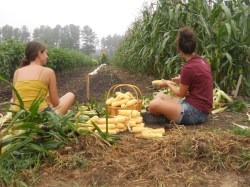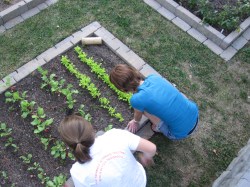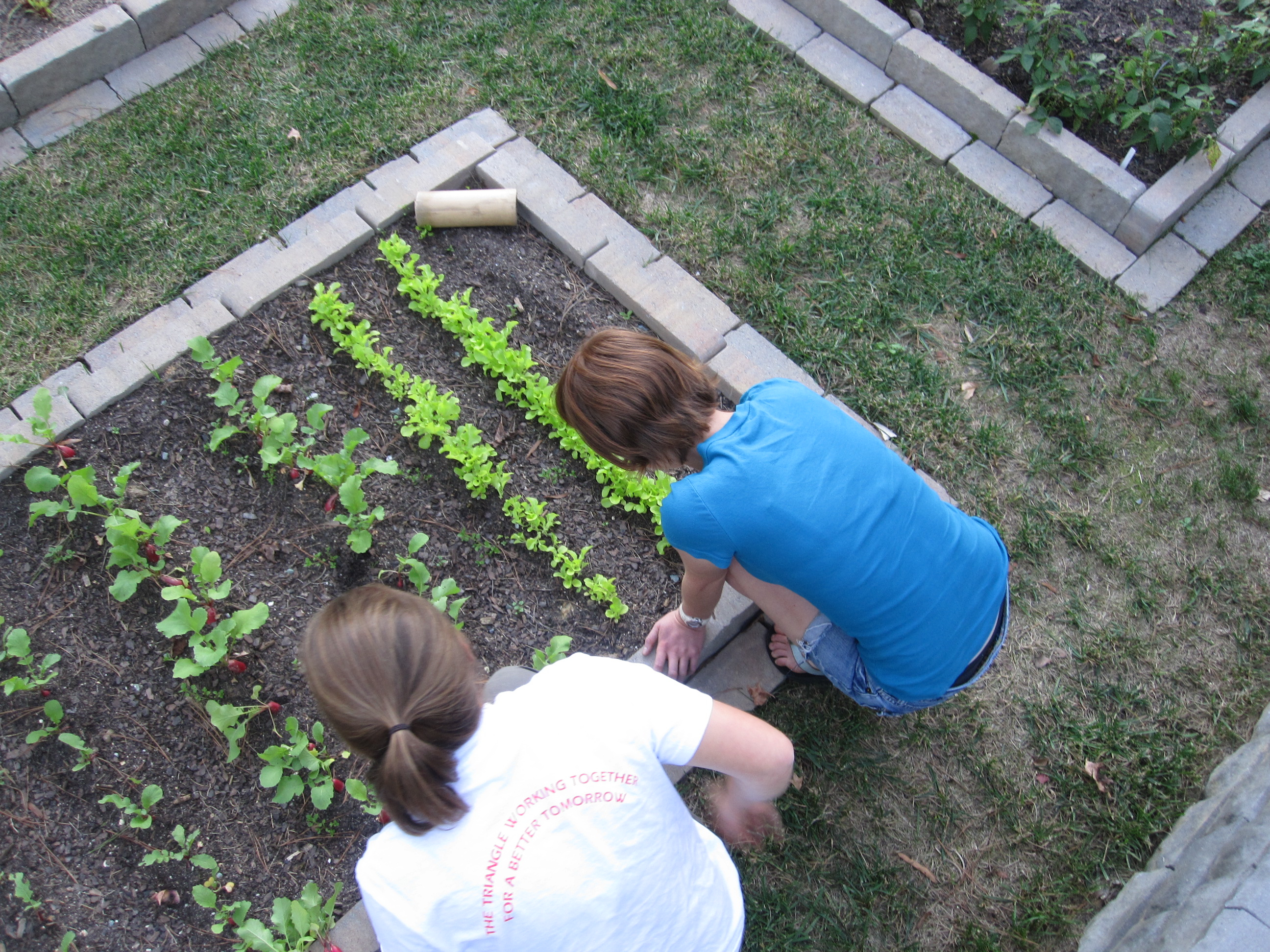
Duke Campus Farm Manager Emily Sloss and intern Katie Jones shuck corn before heading to market.
Emily McGinty was in high school when the ideas of Michael Pollan and other food-movement leaders began to spread, and she caught the bug. At Duke University, she says, “I was able to put a lot of these bigger questions about food in context,” connecting them to what she was learning in classes about economics and policy. She also had a chance to indulge her “honest interest in just getting my hands in the dirt” by managing a community garden on campus and working for the school’s new commercial farm.
Now a senior, McGinty has seen interest in food and farming issues slowly gather steam on campus over the last few years. At an elite university like Duke, where the most popular majors include biology, economics, and political science, “there aren’t clearly carved-out academic paths for students interested in studying anything food-related,” she says. “I’ve been lucky enough to watch that change bit by bit.”
The commercial farm started as a hypothetical class project. Now in its second growing season, and tended by work-study students, the farm grows bulk produce to be sold to campus dining halls, which are run by Bon Appetit Management Company (BAMCO). The food-service company has a reputation for leading the way on local food, humane meat, farmworker justice, and sustainable seafood. It’s also focused on building and supporting campus food networks.
BAMCO’s latest project recognizes the need for student farms to connect not only with hyper-local markets, but with each other, so they can share resources and support. Campus Farmers, an online social network that allows them to do just that, officially launched on Oct. 24 (World Food Day), as a joint effort by BAMCO and Kitchen Gardeners International (KGI). Campus Farmers is a subset of KGI’s larger network.

Nicole ToccoEmily McGinty and Hilary Henry working in the Duke Community Garden.
“Students trying to grow food on campuses are in a really unique situation,” says Nicole Tocco, BAMCO’s East Coast fellow. “They’re trying to work with academic calendars and make them match up with natural systems. They often have a big volunteer workforce, but that workforce is gone for the whole summer, when most of the work has to be done.”
Tocco says the idea for Campus Farmers started when the BAMCO team at Gallaudet University was working with students to start a garden. “They were surprised by how little information existed centrally to help them along the way,” she says.
The Campus Farmers website — which students from 30 to 40 schools currently use — has a place where users can upload documents like budgets, annual reports, and job descriptions for interns, as well as a feature called Classroom Connections, where students can post papers they’ve written on food policy and agriculture issues. Through the site, campus farmers can share anything that might be useful to their peers around the country, from business plans to “a bunch of clever ideas for convincing students why beets and turnips taste awesome,” McGinty says. And though it’s geared toward farmers at colleges and universities, Tocco says it’s by no means exclusive to them — other farmers may find useful information there as well.
“One of the goals is to encourage and unite young farmers,” Tocco says. In doing so, the site also advances BAMCO’s overall mission of building a more sustainable food system. These students may leave their campus farms in just a few years, but, Tocco says, “later on, you’ll either have a new farmer in a country with a dwindling number of farmers, or you’ll have a really educated consumer.”
McGinty points out that some of today’s student farmers could have an even bigger influence down the road. “Duke’s not going to be graduating a lot of farmers, but it is going to be graduating a lot of folks who are going to be making big decisions in D.C. and on Wall Street,” she says.
The failure of California’s Prop 37 — which would have labeled genetically modified food — led some to wonder whether the so-called “food movement” really had any bite behind its bark. Here at Grist, Twilight Greenaway argued that whatever the outcome, the Prop 37 fight marked a coming-of-age moment for that movement — one that we hope will ultimately strengthen it, not splinter it. McGinty sees Campus Farmers as a means to that end — a way to bolster sustainable food advocates from the bottom up. “If we do see ourselves as pieces of a larger movement,” she says, “we absolutely need to be sharing our resources.”
Tocco agrees. “I hope Campus Farmers can play a role in tying the network together,” she says, “and helping [students] recognize that they’re part of something bigger.”



